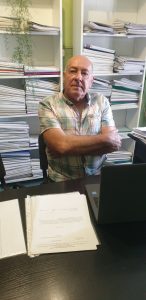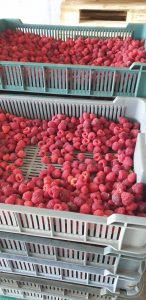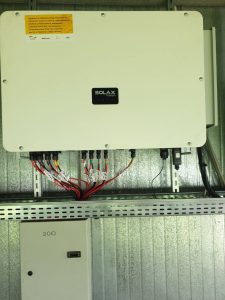
- About NDI
- Programs
- To banks
- For enterprises
- News BDF
- Public information
- Home
- Success stories
- Raspberries that aren’t afraid of frost
Raspberries that aren’t afraid of frost
How a business in Rivne region expands exports, supports the community – and becomes energy-independent
Oleksandr Turevych from the village of Zdovbytsia, Rivne region, is building a berry business while also creating a market for those who grow berries in their gardens. Every year, the company Agro-Frost receives tons of raspberries, freezes them, sorts them, packages them – and ships them to Europe. And now, thanks to a new solar power station, it has also become energy-independent.
“Our raspberries don’t travel hundreds of kilometers. People from nearby villages bring them straight from the field – from Dubno, Kremenets, Pochaiv. We accept them, freeze them – and the quality stays intact, as if freshly picked,” says the entrepreneur.
From renting to own production
Back in the 2010s, Oleksandr already had experience in the berry business – he аwas working through rented cold storages. But over time, he saw that demand was growing, while local infrastructure was nearly non-existent. Then he decided: it’s time to build his own.
Today, in season, Agro-Frost ships up to 200 tons of product, with its raspberries going to Poland and beyond – to the UK, France, the Netherlands.
“Our berries are hand-picked and sorted with care. If a batch contains 95 good berries out of 100, they must all be whole and uniform. That’s quality for export, and our clients already know this is green-line checked – everything verified, no delays,” the entrepreneur proudly says.
They grew it themselves – until people went to the front
Until 2022, Agro-Frost had its own plantations covering 3.5 hectares. But after the start of the full-scale war, many employees were mobilized.
“Some volunteered, others were drafted. So we’ve paused our own growing for now – and focused on processing. Now we buy raspberries from farmers and even regular locals. Sometimes a grandma brings 2–3 kilograms from the village. And it’s more money for her than her pension,” Oleksandr shares.
During the season, the company employs up to 20 people – mostly women. “You can’t mechanize raspberry processing; it requires delicate manual labor. Sorting, handpicking, packing – all done by hand, and that’s why the quality is so high,” he explains.
Despite the difficulties, in 2022–2023 the company doubled its production capacity: added new freezers, bought new equipment. Part of the expenses was covered through bank loans. “The bank sees our volumes and gladly finances us. We take loans, pay them off – and take more,” he says.
450 square meters of sun
The first electricity supply challenges came in late 2022. The company bought a diesel generator, but it didn’t meet all their needs. “Freezers must stay at -20. Compressors run non-stop. And when power goes out, the systems stop – risking product loss.”
In 2024, Oleksandr found out about the grant “Support for the Energy Resilience of Micro and Small Enterprises in Ukraine” and decided to apply. He chose the component that combines the grant with a bank loan, and successfully received funding to install a solar power station.
Now Agro-Frost operates a 120 kW solar plant that covers 450 square meters of roof. “Back during the design phase, I said: orient the building to the south. We’re putting solar here. Back then it was a dream. Now – it’s reality,” he smiles.
The system has no batteries, so it only works during the day. But according to estimates, in peak months – July, August, September – the sun will cover up to 35% of the company’s energy needs. “It’s not 100%, but it’s significant. What we save goes to repay the loan. And after that – everything we save we’ll invest in development,” says Oleksandr.
Support that multiplies
The entrepreneur is convinced – this kind of support is not only about saving money. It’s an investment in resilience, development, and the well-being of the local community.
“It’s not just business. Farmers get a market, women get work, villages get life. When we are helped – we can help others,” emphasizes the entrepreneur.
The company plans to return to cultivation and add new crops: rhubarb, sea buckthorn, sour cherries. But the main goal – is to wait for victory.
“We’re waiting for victory. So that those who went to defend the country can return. Then we can grow our production and also – communities, the economy, the country. But we need calm and hands,” he says.
In the meantime, the company is not standing still: it invests in new capacities, modernizes equipment, ensures efficiency and transparency. “Production can’t stand still. It must improve, or you’ll be overtaken. This grant – it’s not just about savings. It’s another step forward. And it’s – very important.”
This publication was prepared within the support of the international cooperation project “Energy resilience support for micro and small enterprises in Ukraine” under the ReACT4UA Program (Utilization and Implementation of the Association Agreement between the EU and Ukraine in the field of Trade) that is co-funded by the German Government and the Norwegian Agency for Development Cooperation (NORAD). It is implemented by the German federal company “Deutsche Gesellschaft für Internationale Zusammenarbeit (GIZ) GmbH”.
The project aims to increase the resilience of the Ukrainian economy to recurrent power outages and assure business continuity of Micro, Small and Medium Enterprises (MSMEs) by financially supporting solutions for an uniterrupted access to electricity.
The content of this publication is the sole responsibility of the Business Development Fund and does not necessarily reflect the views of the Government of Germany, NORAD, or GIZ.



